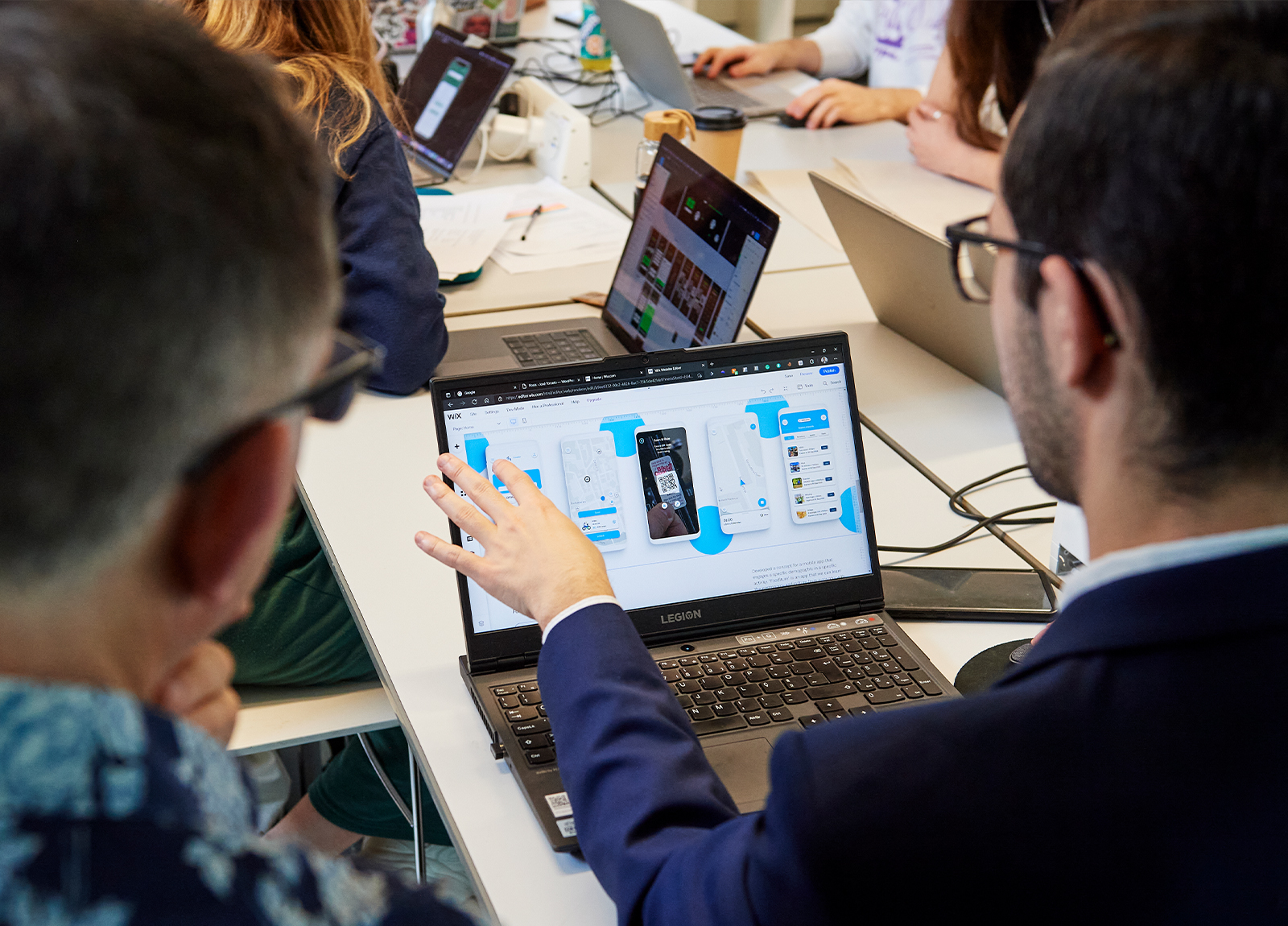
Business Management BA (Hons)
Explore contemporary business practices, contexts and debates through a hands-on, practical approach designed to deepen your understanding of today’s business landscape.
-
Course Duration
3 Years
-
Course Options
Diploma Year
-
Typical Offer
104-120 UCAS Tariff Points
- How to Apply Request a prospectus
-
Annual Fees
- Home (full-time) £9,790
- Overseas (full-time) £18,860
-
UCAS code
- BM01
- Institution code: N39
-
Course Start
September 2026
Our course combines real-world applications with core business knowledge, equipping you to develop effective solutions for complex scenarios.
You’ll learn how to apply practical and realistic solutions to complex business scenarios, studying areas including decision-making, contemporary business environments and strategies.
You will become an innovative leader, team player, articulate presenter, and problem solver, gaining invaluable experience working on real client projects, enhancing your CV, and preparing you for graduate employability with practical skills and insights that align with latest industry demands.
Why study with us
-
Enhance your knowledge of the key business principles and learn how to apply them to real-life situations and collaborative opportunities.
-
Benefit from small class sizes through lectures, seminars and interactive workshops. Enhance your understanding through group projects, presentations, and case study analysis, giving you a practical grasp of complex business concepts.
-
Develop sought-after entrepreneurial and transferable skills in problem-solving, creative thinking, pitches and presentations, and effective communication.
-
Connect with business leaders from well-known brands, expanding your professional network and gaining valuable insights from experts in the industry.
Course Details
Year 1
Core Units
Introduction to studying Business Management (40 credits)
This unit provides a comprehensive foundation in business and management, covering essential theories, the latest industry developments, and an in-depth understanding of the contemporary business environment. You’ll explore core concepts through engaging lectures, including business models and structures, market analysis tools like the 4 Ps, strategic planning frameworks such as SWOT, and key motivational drivers. You will also gain insights into crucial business functions, including operations, finance, human resource management, and leadership. Guest lectures from industry professionals offer valuable perspectives on real-world practices, while one-on-one tutorials provide tailored feedback to support your progress. Writing workshops will enhance your critical analysis and reflective skills, while discussions and pitching exercises develop verbal communication. Additionally, goal setting and time-management strategies will equip you with essential tools for success in your future business management career.
(40 credits)
Research Methods in Business Management (40 credits)
Understanding the role of research and the power of evidence in supporting arguments is fundamental to business management. This unit provides a comprehensive foundation in consumer behaviour and business analysis, guiding students through key concepts like demographics, buyer influences, decision-making processes, consumer trends, and data protection (GDPR). Students will develop practical skills with analytical tools, including SWOT, PESTEL, Porter’s Five Forces, scenario planning, cost-benefit analysis, and digital data techniques, building a strategic toolkit for informed decision-making. With an emphasis on data analytics, this unit will equip students to collect, analyse, and apply data effectively to improve operational performance and customer satisfaction. Verbal communication and project management skills are developed through presentation workshops and time management seminars, ensuring students are prepared for their academic journey and future careers in business management.
(40 credits)
Concepts, Theories and Practice in Business Management (40 credits)
In this unit, you will explore some key contemporary business management concepts. You will be introduced to key themes and challenges in entrepreneurial thinking, including the role of the entrepreneur, strategic mindset, innovation and creativity, risk-taking, adaptability, funding, and the processes of start-ups, scaling, and growth. Lectures cover critical issues and debates shaping the business landscape, with guest speakers offering insights into real-world practices. You will develop research skills to identify market opportunities and deliver innovative products and services through market analysis, consumer research, differentiation strategies, and operations and cost evaluation, all while considering ethical and sustainable business practices. Interactive sessions will emphasise best practices in consumer data gathering, such as focus groups, questionnaires, and interviews while exploring legal, ethical, and socially responsible business commitments.
(40 credits)
Core Projects
Wayfinding Week
The first week of each academic year is called Wayfinding week. It’s an opportunity get your bearings, establish new connections and, after your first year at Norwich, re-establish old ones. Your course team will talk you through the year ahead and explain the expectations for the year. We’ll help you navigate new encounters and identify areas to focus on as you progress through your course.
Make it Manifest(o)
An important element of Wayfinding Week is taking part in our annual ‘Make it Manifest(o)’ project. Your course team will introduce the project in which we’ll ask you to consider your hopes and vision of the year ahead at Norwich and work with students in other year groups to bring your ideas to life. The project culminates in a celebratory display of work across the campus. The project will help you to develop your critical creativity through different approaches, concepts, and mediums. You’ll encounter diverse perspectives and build friendships and networks within our university community.
Interchange Week
Interchange weeks are opportunities to step away from your disciplinary studies and engage in projects, workshops, visits and talks that extend your knowledge and understanding of the world. Whether you learn a new skill or take part in a global challenge project with students from other courses, you will come away with new insights to take back to your course. Interchange is part of the schedule for all Norwich students with sessions held across and beyond the campus led by university staff, visiting lecturers and students.
Year 2
Core Units
Models, Methods and Practice in Business Management (40 credits)
This unit explores fundamental Business Models and strategies, equipping students with the knowledge and understanding to define and drive organisational goals, structure, and decision-making processes. Through lectures, seminars, and workshops, students will examine key business components, including ownership types, industry classifications, market structures (B2C, B2B, C2C), and purposes (profit or non-profit). Emphasis is placed on digital innovation in business, covering e-commerce strategies and AI. Workshops will enhance practical skills in business planning, execution, and performance evaluation, while practical sessions introduce techniques for professional presentations, pitch decks, and case studies, preparing students for the demands of the business world.
(40 credits)
Global Citizenship and Perspectives in Business Management (40 credits)
This unit explores strategic development for international business, examining factors such as cultural and economic conditions, legal frameworks, political and social contexts, technological infrastructure, logistical challenges, and environmental considerations. Through lectures, seminars, and group discussions, students will analyse sustainable and ethical business practices, develop industry awareness, and apply these approaches to their projects. Research Practice and Critical Thinking sessions introduce strategic research methods and data visualisation techniques. The industry guest lecture series provides career insights, while group sessions emphasise teamwork skills and professional presentation standards for reports.
(40 credits)
Collaborative Approaches to Business Management (40 credits)
This unit focuses on the importance and value of collaboration in business management and operations. You will explore the live events industry through a collaborative project encompassing event business essentials, market analysis, audience targeting, budget planning, marketing strategy, operations, and logistics. You’ll gain hands-on experience in multidisciplinary techniques and event evaluation. Workshops focus on creative idea generation, decision-making, and collaborative planning, while lectures cover project management, time management, and key responsibilities in event planning. Careers-focused seminars and workshops will enhance your professional networking, risk assessment, budgeting, digital presentation skills, and team-building techniques for effective collaboration.
(40 credits)
Core Projects
Wayfinding Week
The first week of each academic year is called Wayfinding week. It’s an opportunity get your bearings, establish new connections and, after your first year at Norwich, re-establish old ones. Your course team will talk you through the year ahead and explain the expectations for the year. We’ll help you navigate new encounters and identify areas to focus on as you progress through your course.
Make it Manifest(o)
An important element of Wayfinding Week is taking part in our annual ‘Make it Manifest(o)’ project. Your course team will introduce the project in which we’ll ask you to consider your hopes and vision of the year ahead at Norwich and work with students in other year groups to bring your ideas to life. The project culminates in a celebratory display of work across the campus. The project will help you to develop your critical creativity through different approaches, concepts, and mediums. You’ll encounter diverse perspectives and build friendships and networks within our university community.
Interchange Week
Interchange weeks are opportunities to step away from your disciplinary studies and engage in projects, workshops, visits and talks that extend your knowledge and understanding of the world. Whether you learn a new skill or take part in a global challenge project with students from other courses, you will come away with new insights to take back to your course. Interchange is part of the schedule for all Norwich students with sessions held across and beyond the campus led by university staff, visiting lecturers and students.
Diploma Year (optional)
Level 5 Diploma (120 credits)
Students have the opportunity to spend a year after the second of their degree (or the third year if studying for a degree with an Integrated Foundation Year) enhancing their employability options through a Level 5 Diploma. They can choose from courses designed to provide:
- opportunities to gain industry insight, developing employability skills through a series of supported experiences, expanding professional networks and building confidence in the workplace, or
- an introduction to creative computing, building an understanding of how coding skills can be used to advance and complement creative practice.
Final Year
Core Units
Professional Development in Business Management (40 credits)
This is the first of three units that make up your final year of undergraduate study. This unit focuses on your career development, guiding students in setting personal career goals, creating action plans, and building resilience and adaptability. Lectures, seminars, and workshops cover crucial career preparation skills, including interview techniques, networking strategies, and self-promotion. Insights into business management roles, career paths, and professional organisations are provided through guest lectures, networking workshops, and industry case studies, addressing emerging industry trends and challenges. You’ll analyse case studies, explore company cultures, and examine market insights. Careers and Personal Development sessions deepen your understanding of the business landscape, exploring job roles, business startups, and post-graduate opportunities.
(40 credits)
Advanced Research and Project Design in Business Management (40 credits)
This unit examines sustainable and ethical practices within business management, encouraging students to apply these principles to their projects. Through lectures and group discussions, students will explore core theories, contextual analysis, and the latest industry developments. Research-focused workshops provide practical training in methodologies, data collection, and proposal writing, ensuring students can confidently design and present research with ethical considerations. Lectures on research proposals will guide students in structuring professional documents with clear objectives, literature reviews, methodologies, and proper referencing, laying a strong foundation for conducting and communicating impactful marketing research to support business cases.
(40 credits)
Major Project in Business Management (40 credits)
This is the third and final unit which completes your final year of undergraduate study. The unit is a culmination of your study at degree level and builds on everything you’ve learnt so far and provides a comprehensive understanding of effective business strategies. Lectures and case study reviews will explore key areas of investigation, including ethical awareness, social advocacy and corporate responsibility. You will undertake a purposeful, individual, in-depth study of a relevant topic, developing your independent learning, critical thinking and knowledge of relevant research techniques. The project will develop your ability to and deliver a robust business plan that includes Market Analysis, Organisation and Management, Products and Services, Marketing Strategy, Operational Plan and Funding and financial forecasting. You will learn to utilise and improve your time management and communication skills and test your initiative and resourcefulness. By the end of the unit, you should feel well equipped to apply what you have learned in a professional context and have a clear trajectory towards launching your professional career as a graduate of Norwich.
(40 credits)
Core Projects
Wayfinding Week
The first week of each academic year is called Wayfinding week. It’s an opportunity get your bearings, establish new connections and, after your first year at Norwich, re-establish old ones. Your course team will talk you through the year ahead and explain the expectations for the year. We’ll help you navigate new encounters and identify areas to focus on as you progress through your course.
Make it Manifest(o)
An important element of Wayfinding Week is taking part in our annual ‘Make it Manifest(o)’ project. Your course team will introduce the project in which we’ll ask you to consider your hopes and vision of the year ahead at Norwich and work with students in other year groups to bring your ideas to life. The project culminates in a celebratory display of work across the campus. The project will help you to develop your critical creativity through different approaches, concepts, and mediums. You’ll encounter diverse perspectives and build friendships and networks within our university community.
Interchange Week
Interchange weeks are opportunities to step away from your disciplinary studies and engage in projects, workshops, visits and talks that extend your knowledge and understanding of the world. Whether you learn a new skill or take part in a global challenge project with students from other courses, you will come away with new insights to take back to your course. Interchange is part of the schedule for all Norwich students with sessions held across and beyond the campus led by university staff, visiting lecturers and students.
Learning and teaching
This course is taught through a mixture of learning and teaching methods including:
-
Group briefings
-
Academic tutorials
-
Group tutorials
-
Workshops
-
Critiques (crits)
-
Seminars
-
Lectures
Assessment
Assessment for this course is entirely coursework-based, meaning there are no exams. Your progress will be evaluated through the projects and assignments you complete for each unit. Throughout the year, you’ll receive ongoing feedback to help you refine your work and develop your skills. To support your learning and ensure you achieve the course outcomes, we use a variety of assessment methods, including:
- Finished pieces of work
- Presentations
- Written work
- Your research
- A reflective journal
Some of the people you’ll be working with

Typical career paths
Our Business Management degree will help you develop essential transferrable skills, such as teamwork, critical thinking, and time management. Or if your goal is to be your own boss, we will help you understand the process of planning and setting up your own business.
- Business adviser
- Business analyst
- Business development manager
- Data analyst
- Management consultant
- Project manager
- Recruitment consultant
- Civil servant
- Marketing executive
- Sales executive
“92% of our graduates are in employment or further education within six months of graduating”
Graduate Outcomes 2021
Entry requirements
Home
Norwich University of the Arts welcomes applicants of all ages from all backgrounds.
If the qualification that you are studying is not shown, do not worry as we are able to accept other pre-entry qualifications as well as combinations of different qualifications.
A/AS Levels (GCE)
GCE A/AS Levels 3 A-level qualifications at grades BCC (104 UCAS Tariff points) or above. Where candidates are not taking 3 A-levels, Norwich University of the Arts will consider combinations of A-level/AS-level and other Level 3 qualifications.
BTEC Extended Diploma (QCF or RQF)
Distinction, Merit, Merit in an art, design or media related subject
BTEC Diploma (QCF or RQF)
Distinction*, Distinction* in an art, design or media related subject
T Levels
A T Level in any subject with overall grade A* to C (Pass)
UAL Extended Diploma
Merit
UAL Level 3 Foundation Diploma in Art and Design
Pass
UAL Level 4 Foundation Diploma in Art and Design
Pass
Foundation Diploma in Art and Design
Pass
Access to Higher Education Diploma (Art and Design)
Pass
International Baccalaureate Diploma
A minimum of 26 points
Overseas
We accept qualifications from all over the world.
To find our entry requirements from a specific country, please check our dedicated international pages.
English language qualifications
Most international students are required to hold an English language qualification. Applicants are required to have a minimum UKVI approved IELTS exam score of 6.0 overall, with a minimum of 5.5 in each section. Equivalent English language qualifications are acceptable such as, IB English language syllabus A or B/English Literature (Grade 4).
We also accept some alternative English qualifications. Learn more about our English entry requirements.
You can email us on international@norwichuni.ac.uk if you’d like to discuss your application individually.

Fees and funding
Home
Tuition fees for the 2026/27 academic year
- BA course (three year): £9,790 per year
- Integrated Foundation Year (optional): £9,790 per year
- Level 5 Diploma Year (optional): £9,790 year
The level of fee that you will be asked to pay depends on whether you’re classed as a UK (home) or international student. Check your fee status.
Fees for subsequent years
Tuition fees may increase in subsequent years in line with inflation, subject to government regulations. The inflation rate used is expected to be the Retail Price Index excluding mortgage payments (RPIX). We would confirm this in advance to you of each academic year.
Find our more about fees and funding
Funding your study
Depending on your circumstances, you may qualify for a bursary, scholarship or loan to help fund your study and enhance your learning experience.
International
Tuition fees for the 2026/27 academic year
- BA course (three year): £18,860
- Integrated Foundation Year (optional): £18,860
- level 5 Diploma year (optional): £18,860
The level of fee that you will be asked to pay depends on whether you’re classed as a UK (home) or international student. Check your fee status.
Fees for subsequent years
For Overseas students starting in 2026 inflation will be applied to your fees in later years. We will confirm this in advance to you of each academic year, and we will limit the increase to no more than the Office for Students’ recommended inflationary measure.
Find our more about fees and funding
Funding your study
Please take a look at our International students page for information about fees, scholarships for international students, visas and much more.
Additional costs
Your course fees cover the cost of studies, and include loads of benefits, such as the use of our library, support from our expert employability team, access to workshops and free use of the IT equipment across our campuses. There are also other costs which you may need to consider.
How to apply
Home
All applications for undergraduate courses will need to be made via the Universities and Colleges Admissions Service (UCAS).
You’ll need our university UCAS code (N39) as well as your course code which you’ll find on your course page.
When you register with UCAS you will need include your previous and current qualifications information, personal statement, and reference.
Once we receive your application form through UCAS, we will email confirmation that we have received it and will give you access and instructions for logging into the applicant portal. Our decision will be communicated via UCAS.
Applying for an undergraduate degreeInternational
Full-time Undergraduate International applicants can either apply via UCAS or directly by completing the online application form below or emailing the downloadable form to ioadmissions@norwichuni.ac.uk
Online Application Form (opens in a new window)For further support for international applicants applying for an undergraduate degree view our international pages.

Latest news
-
 East Gallery •
East Gallery •Announcing the East Gallery Fellows 2025-2026
Norwich University of the Arts is pleased to announce the selected awardees of this year's East Gallery Fellowship. -
 BA Business Management •
BA Business Management •Dean of Creative Education Awarded Prestigious Principal Fellowship from Advance HE
The University is delighted to announce that Hilary Carlisle, Dean of Creative Education and Professor of Design, has been awarded Principal Fellowship of the Higher Education Academy (PFHEA) by Advance HE -
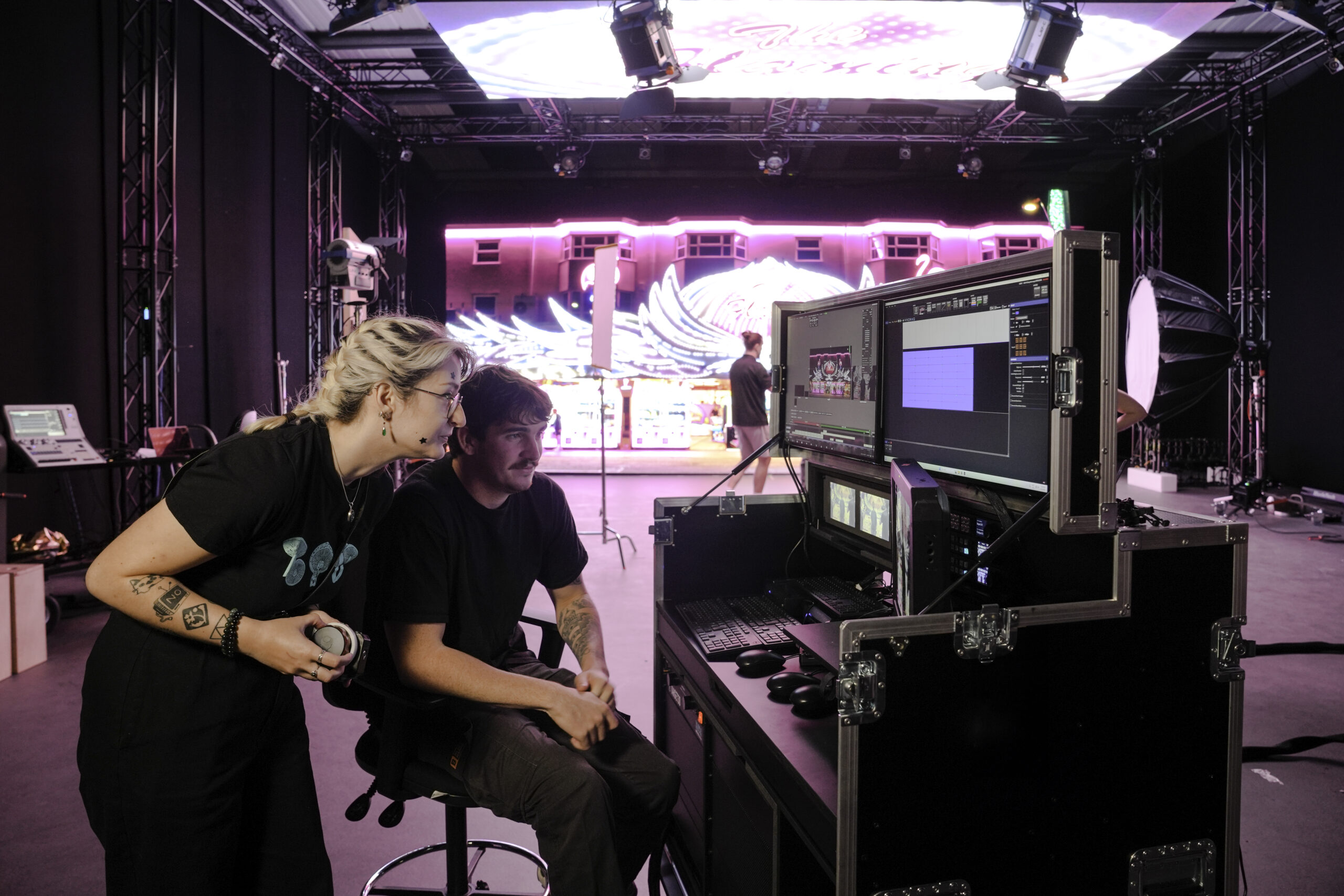 BA Degree •
BA Degree •Norwich University of the Arts to Host ELIA Academy 2027
Norwich University of the Arts is delighted to announce that it has been selected as the host institution for the ELIA Academy 2027. -
 BA Business Management •
BA Business Management •In conversation with Norwich’s newest lecturers in Marketing and Business Management
We joined Norwich's newest lecturers, Stephen Balmer-Walters and Laurie McAllister, to find out more about the University's Marketing and Business Management courses. -
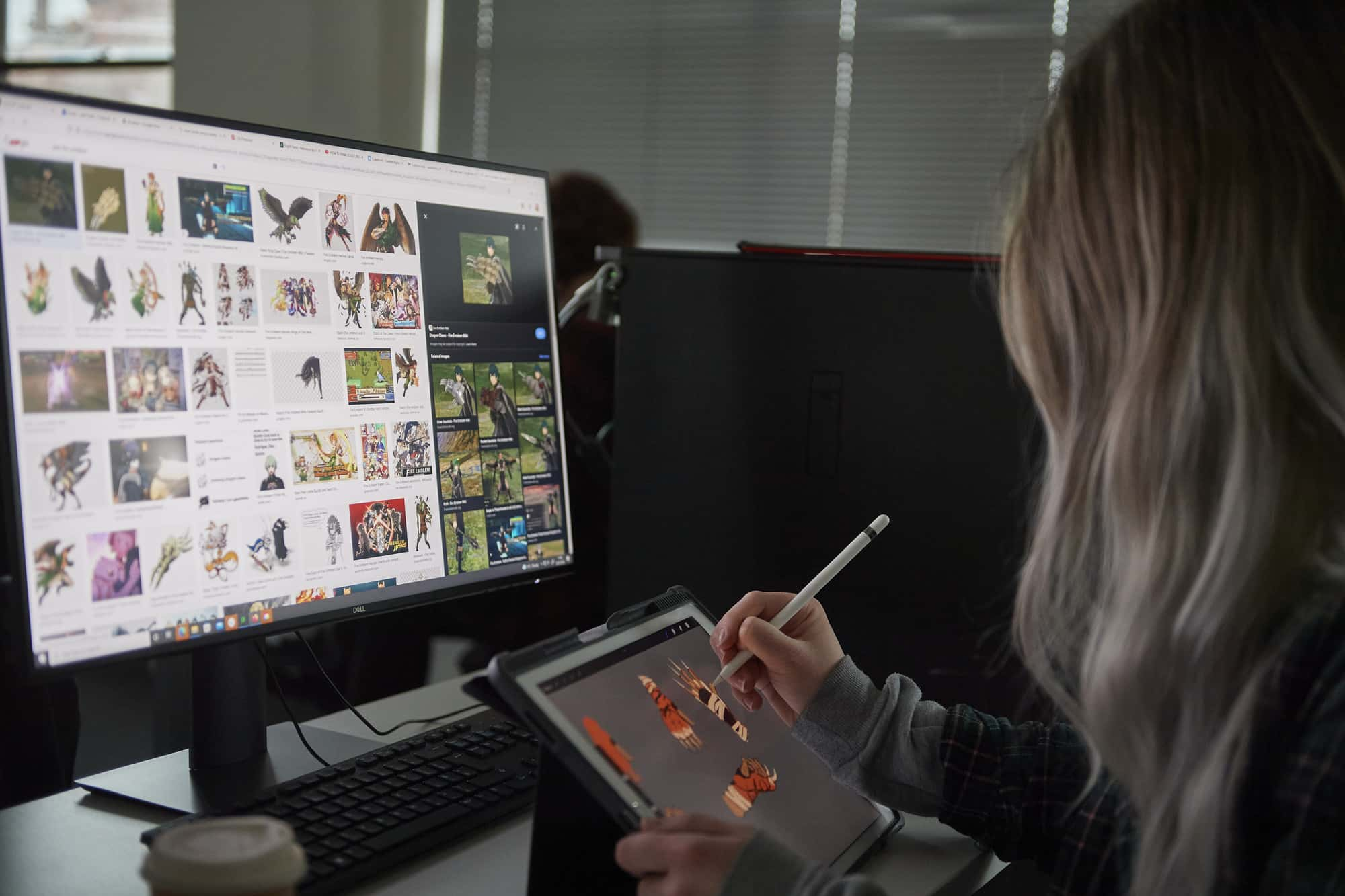 BA Games Art and Design •
BA Games Art and Design •East of England set to become UK’s next Games Cluster, says landmark report
A major new report is calling for the creation of a Games Cluster for the East of England — positioning the region as a national leader in creative technology and immersive media. -
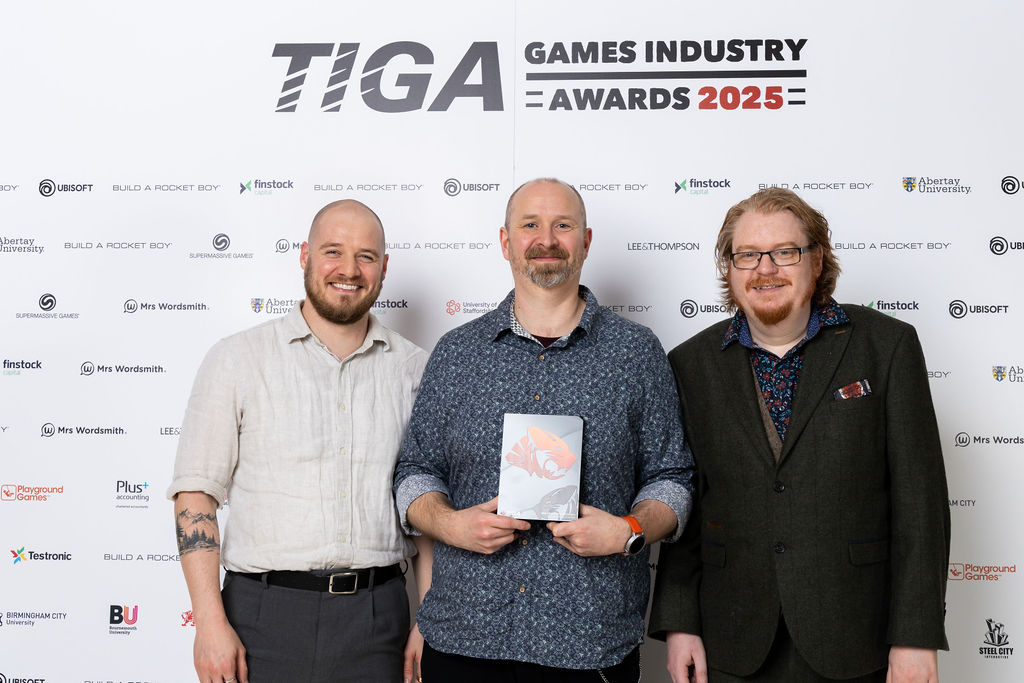 BA Games Art and Design •
BA Games Art and Design •Norwich awarded Best Education Initiative at the TIGA UK Games Industry Awards
TIGA, who represent the UK video games industry, have recognised the University’s commitment to graduate success and industry-focused learning in their 2025 awards. -
 BA Animation •
BA Animation •Cutting edge Sony Virtual Production Studio puts Norwich on the map for the future of film and gaming
Norwich University of the Arts and Sony open new landmark facility for students, creators and the community. -
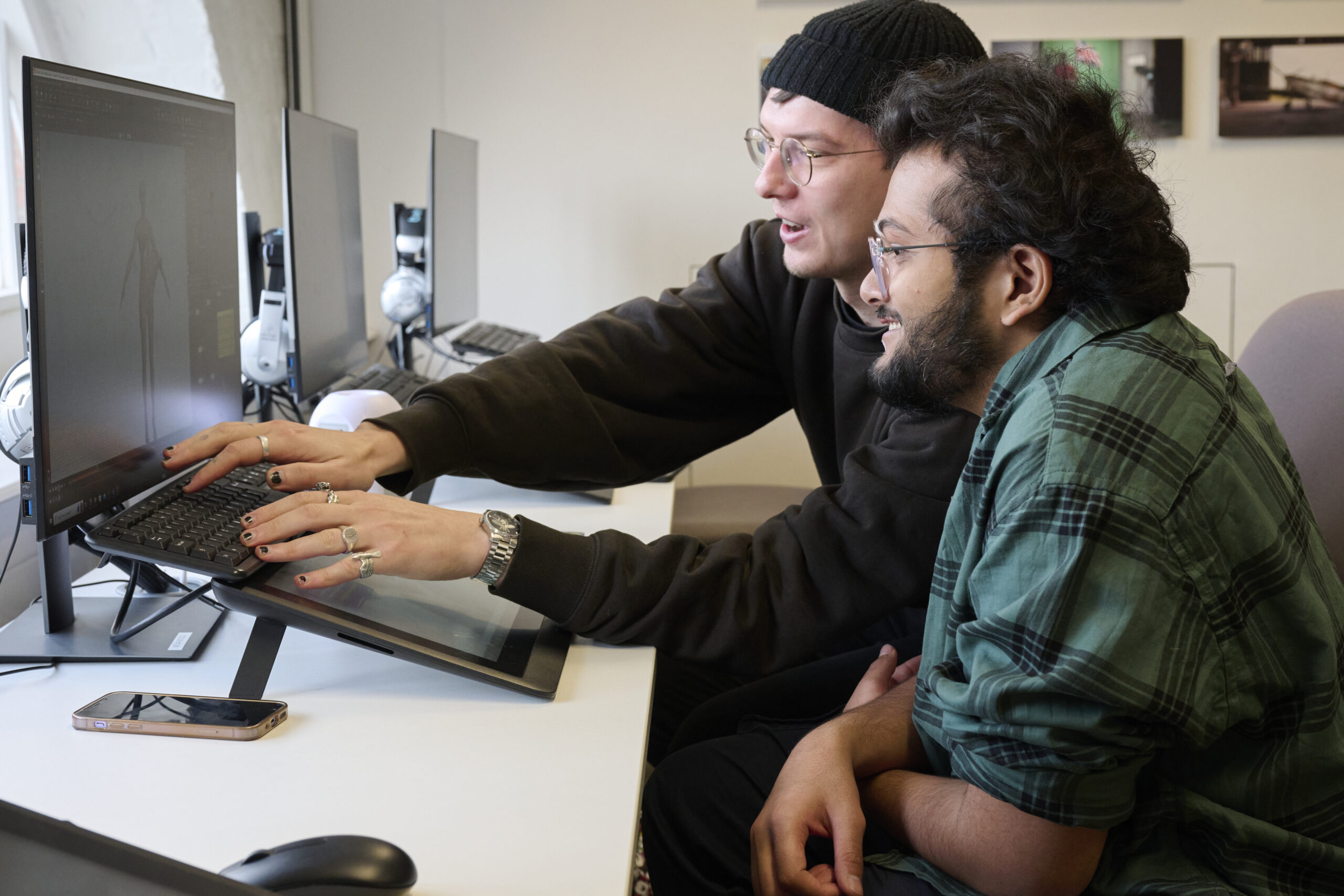 BA Animation •
BA Animation •Norwich named top UK university for production excellence in visual effects
The University has been placed in three categories in the 2025 Rookies Global School Rankings, including the top five for Production Excellence – Visual Effects. -
 BA Photography •
BA Photography •Entries open for Norwich's 2026 Beyond the Frame photography competition
Entries are now open for our annual photography competition, open to students aged 11 to 19 around the world. -
 BSc Degree •
BSc Degree •Norwich University welcomes new academics to its Psychology and Computer Science courses
Lyndsey Wallace joins the University as Senior Lecturer for BSc (Hons) Psychology, with Jawwad Chattha joining as Course Leader for BSc (Hons) Computer Science. -
 BA Architecture •
BA Architecture •Norwich University of the Arts presents the Peter Cook: Wonder Hub
Norwich University has launched the Peter Cook: Wonder Hub, a vibrant and interactive space for thinking, making, showcasing and debating the creative arts. -
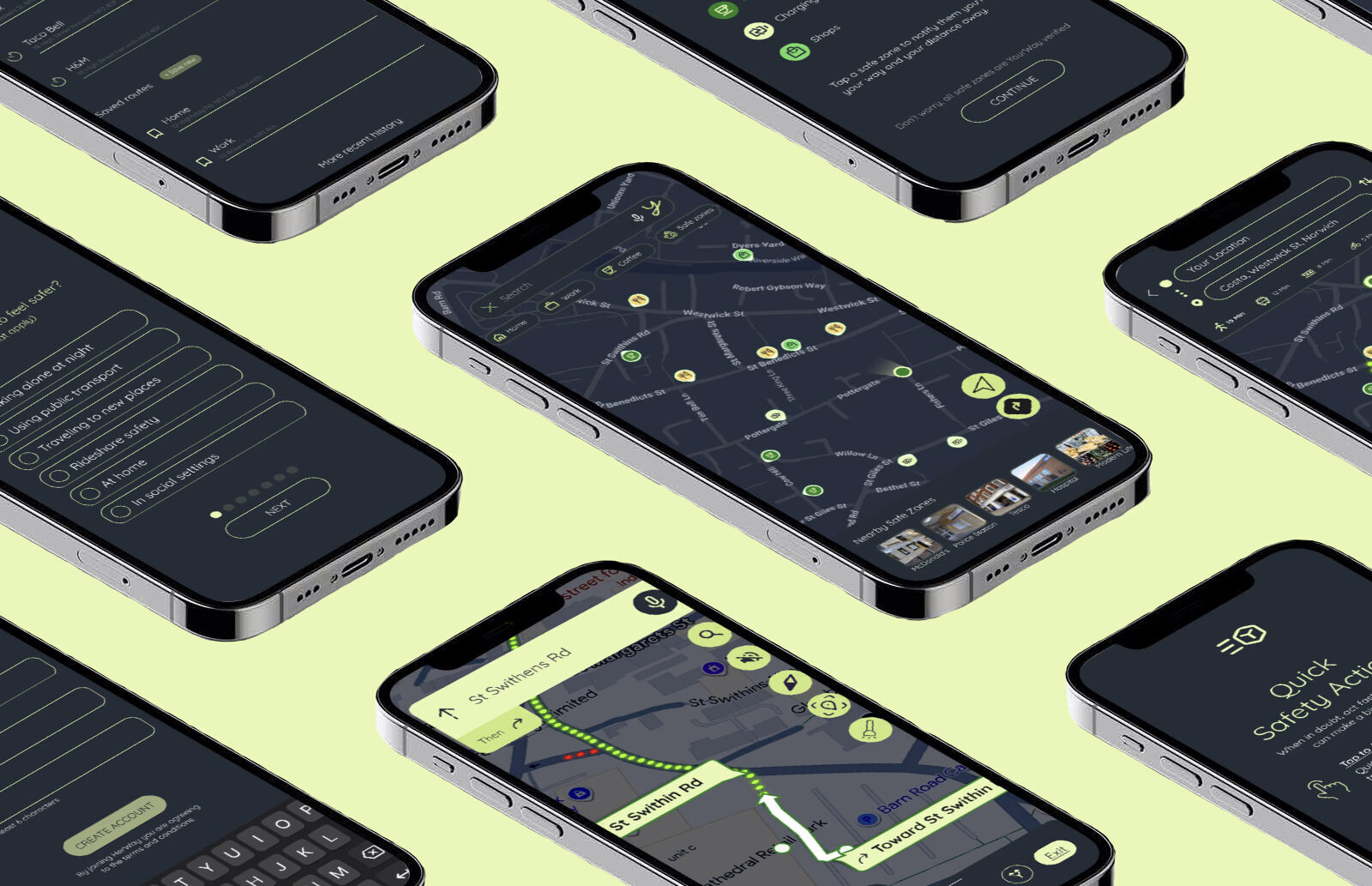 BA Graphic Communication •
BA Graphic Communication •Norwich students celebrate success at 2025 Creative Conscience Awards
Students from Norwich University of the Arts have been recognised across categories in this year’s awards, which showcase work focusing on social or environmental impact -
 BA Games Art and Design •
BA Games Art and Design •Norwich graduates recognised at TIGA UK Games Education Awards
Charlie O'Shea, BA (Hons) Games Art and Design has been named 'Outstanding TIGA Graduate of the Year: Designer' -
 BA Film and Moving Image Production •
BA Film and Moving Image Production •Dear future international students – Diya Vaya, BA (Hons) Film and Moving Image Production
Diya writes about the experience of moving to Norwich from Nairobi, and her advice to future international students. -
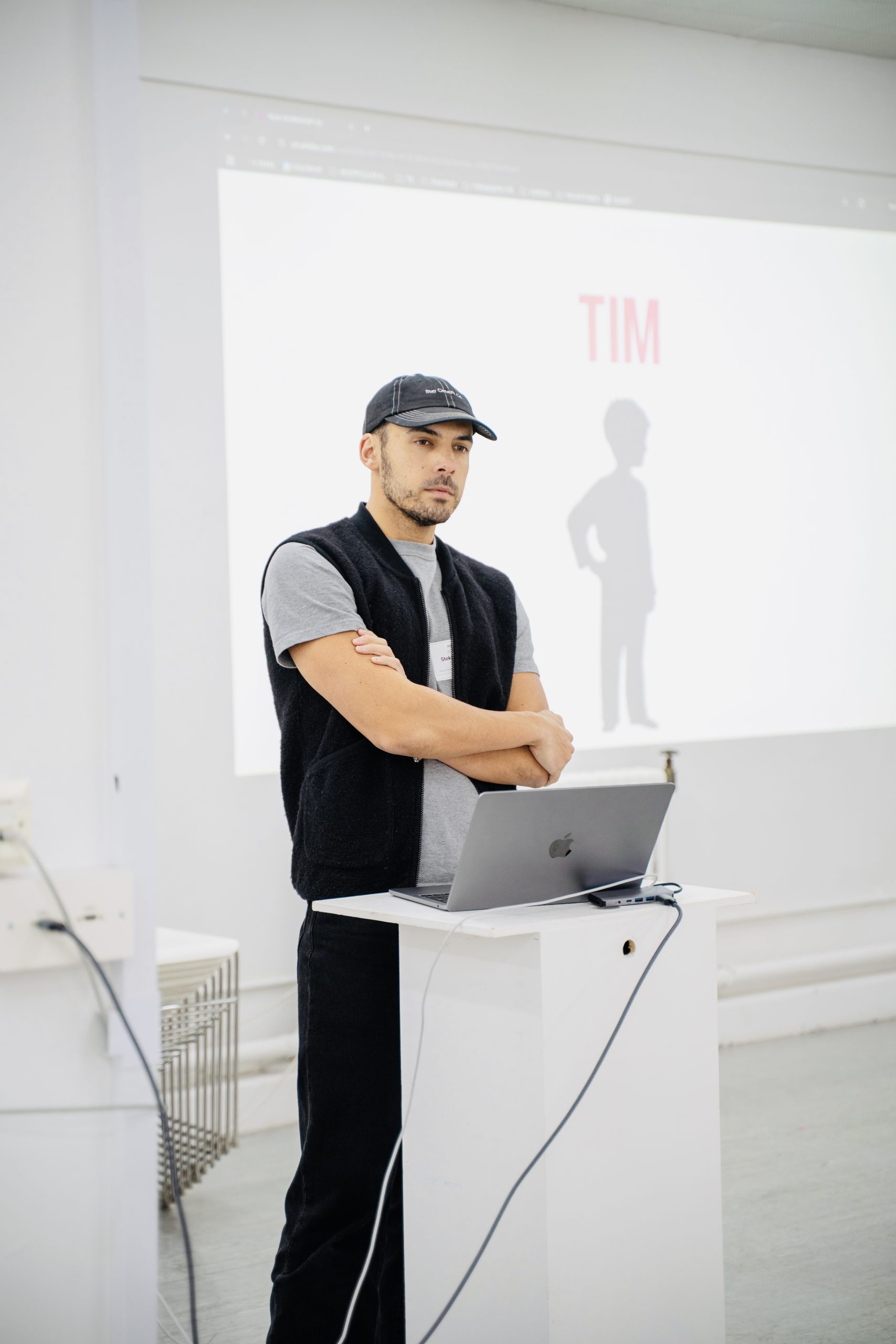 Course •
Course •Inside Interchange Week with Stokely Howard of Trendy Grandad
Stokely Howard, Co-Founder and Creative Director of video production company Trendy Grandad, shares his reflections on Norwich’s cross-course collaboration week. -
 MA Communication Design •
MA Communication Design •Norwich announces Sustainability Award winners at Postgrad Festival 2025
Norwich University of the Arts' Sustainability Awards celebrate students’ commitment to sustainable and ethical practice.

